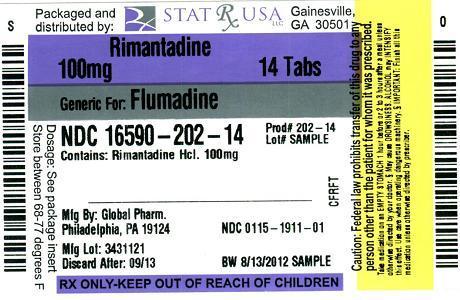Most health expert recommend six month of exclusive breastfeeding but statics suggest that numbers are not good, almost 95% mothers start breastfeeding but this number drops to 40% in first three month and further it drops to 15% till fifth month. Sometime its due to need of medication usage. Because of these statics its important to provide good information on safety of drugs in breastfeeding so that it can be improved when possible. In this FAQ sheet we will discuss about exposure to Rimantadine Hydrochloride Tablet while breastfeeding. We will also discuss about common side effects and warnings associated with Rimantadine Hydrochloride Tablet.
What is Rimantadine Hydrochloride Tablet used for?
Rimantadine hydrochloride tablet is indicated for the prophylaxis and treatment of illness caused by various strains of influenza A virus in adults (17 years and older). Rimantadine hydrochloride tablet is indicated for prophylaxis against influenza A virus in children (1 year to 16 years of age). PROPHYLAXIS In controlled studies of children (1 year to 16 years of age), healthy adults (17 years and older), and elderly patients (65 years of age and older), rimantadine hydrochloride has been shown to be safe and effective in preventing signs and symptoms of infection caused by various strains of influenza A virus. Since rimantadine hydrochloride does not completely prevent the host immune response to influenza A infection, individuals who take this drug may still develop immune responses to natural disease or vaccination and may be protected when later exposed to antigenically-related viruses. Following vaccination during an influenza outbreak, rimantadine hydrochloride prophylaxis should be considered for the 2 to 4 week time period required to develop an antibody response. However, the safety and effectiveness of rimantadine hydrochloride prophylaxis have not been demonstrated for longer than 6 weeks. TREATMENT Rimantadine hydrochloride therapy should be considered for adults (17 years and older) who develop an influenza-like illness during known or suspected influenza A infection in the community. When administered within 48 hours after onset of signs and symptoms of infection caused by influenza A virus strains, rimantadine hydrochloride has been shown to reduce the duration of fever and systemic symptoms. The following points should be considered before initiating treatment or prophylaxis with rimantadine hydrochloride: Rimantadine hydrochloride is not a substitute for early vaccination on an annual basis as recommended by the Centers for Disease Control and Prevention Advisory Committee on Immunization Practices Influenza viruses change over time. Emergence of resistance mutations could decrease drug effectiveness. Other factors (for example, changes in viral virulence) might also diminish clinical benefit of antiviral drugs. Prescribers should consider available information on influenza drug susceptibility patterns and treatment effects when deciding whether to use rimantadine hydrochloride.
Rimantadine Hydrochloride Tablet while breastfeeding safe or not? Can there be any side effects for infant while using it during breastfeeding?
Rimantadine hydrochloride is the one and only active ingredient present in Rimantadine Hydrochloride Tablet. Rimantadine hydrochloride in itself is a low risk drug for lactation so it is easy to understand that Rimantadine Hydrochloride Tablet also comes in category of Low Risk item while breastfeeding. Below is the summary of Rimantadine hydrochloride in breastfeeding.
Statement of Manufacturer/Labeler about breastfeeding usage
NURSING MOTHERS Rimantadine hydrochloride should not be administered to nursing mothers because of the adverse effects noted in offspring of rats treated with rimantadine during the nursing period. Rimantadine is concentrated in rat milk in a dose-related manner: 2 to 3 hours following administration of rimantadine, rat breast milk levels were approximately twice those observed in the serum.
Rimantadine Hydrochloride Tablet Breastfeeding Analsys
Low RiskCAS Number: 1501-84-4
An antiviral used in the prophylaxis of influenza A. Since the last update we have not found published data on its excretion in breast milk. Its use is authorized for children from one year of age.Its large volume of distribution makes it unlikely that milk will pass through in significant amounts.Possible side effects are rare and mild. Until there is more published data on this drug in relation to breastfeeding, safer known alternatives may be preferable, especially during the neonatal period and in case of prematurity.
What should I do if already breastfed my kid after using Rimantadine Hydrochloride Tablet?
During whole lactation period you shall first discuss with your doctor and then together you shall decide whether you shall take that drug or not however if you have already taken Rimantadine Hydrochloride Tablet then you shall inform your doctor, But you should not be worried too much as Rimantadine Hydrochloride Tablet comes in category of low risk drug.
I am nursing mother and my doctor has suggested me to use Rimantadine Hydrochloride Tablet, is it safe?
Rimantadine Hydrochloride Tablet comes in category of low risk and if your doctor is aware that you are breastfeeding it should be ok to use without much concerns.
If I am using Rimantadine Hydrochloride Tablet, will my baby need extra monitoring?
Not much
Who can I talk to if I have questions about usage of Rimantadine Hydrochloride Tablet in breastfeeding?
US
National Womens Health and Breastfeeding Helpline: 800-994-9662 (TDD 888-220-5446) 9 a.m. and 6 p.m. ET, Monday through Friday
UK
National Breastfeeding Helpline: 0300-100-0212 9.30am to 9.30pm, daily
Association of Breastfeeding Mothers: 0300-330-5453
La Leche League: 0345-120-2918
The Breastfeeding Network supporter line in Bengali and Sylheti: 0300-456-2421
National Childbirth Trust (NCT): 0300-330-0700
Australia
National Breastfeeding Helpline: 1800-686-268 24 hours a day, 7 days a week
Canada
Telehealth Ontario for breastfeeding: 1-866-797-0000 24 hours a day, 7 days a week


